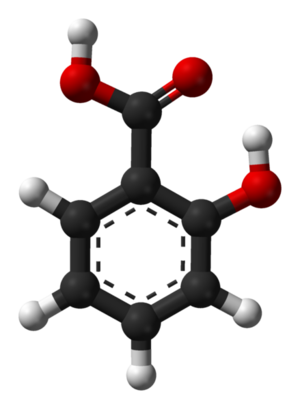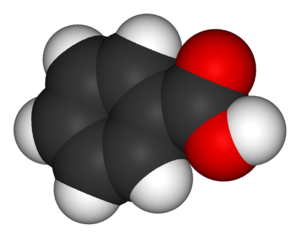Making your own Aspirin
Interview with
Chris - Scientists in Scotland have discovered that humans and possibly many other animals make their own anti-inflammatory chemicals. The person who's made that discovery is Dr Gwen Baxter. She's from Dumfries and Galloway Royal Infirmary. She's here to tell us a little bit more about that. Hello Gwen, thank you for joining us. What are the Chemicals that you've discovered that humans make that are their own aspirin?
 Gwen - It's linked to the finding that salicylic acid can be produced from benzoic acid which hasn't been reported in experiments before.
Gwen - It's linked to the finding that salicylic acid can be produced from benzoic acid which hasn't been reported in experiments before.
Chris - Tell us a little bit about salicylic acid. What is it?
Gwen - Salicylic acid's a very simple compound. It's been around for a long time. It's recorded as being used as a therapeutic agent from about 3000BC when it was used to relieve pain and as an anti-inflammatory agent, if you like and to help reduce temperatures in fevers.
Chris - If we have it in our body already, why do we need to take more of it?
Gwen - What we've discovered is that we seem to be able to produce it ourselves and that's a novel thing that we're reporting. Previously we had assumed it was something that people took in, in perhaps diet. Now we've found that it's produced in people.
Chris - What do you think it's actually doing in the people though?
Gwen - We're thinking it's a bit like considering your endorphins. I think people are familiar with that fact that they can be up-regulated. You can increase the amount circulating should you require to do so in times of stress. It's very close to thinking what happens to salicylic acid in plants. In plants it does act as a responder to stress such as attack by a pathogen. We're saying that humans are possibly in a position to do that same thing because we have shown that we can produce it.
Chris - You can make the same stuff from aspirin. In fact, when you put aspirin into the body it eventually turns into salicylic acid. Do you think that what you've discovered is basically the way in which aspirin or part of the way aspirin works is achieved?
Gwen - Well, I think that if we just go back a wee bit that salicylic acid was used for the things that aspirin is used for. The effect aspirin has on platelets and stops them sticking together which is a therapeutic use of aspirin that salicylic acid doesn't have in the same way although it does act as an anti-inflammatory. More recently it has become involved as the original agent itself, if you like.
 Chris - How do you get the salicylic acid made in the body and does everyone make it and do some people make it more than others?
Chris - How do you get the salicylic acid made in the body and does everyone make it and do some people make it more than others?
Gwen - That's another interesting thing. We've done lots of work over the years with people who would have salicylic acid in their body because they perhaps eat it so obviously vegetarians do have higher levels. No surprises there. We've also looked at people who have been fasting and they still maintain it so obviously it's not coming from diet which was the starting point of 'where is it coming from?' We're thinking that if we can find the store for it - it must be somewhere in the body or some precursor such as benzoic acid, which is a product of lots of other metabolic pathways that we have already recorded in our body - it can be used as a bio-regulator and help with some gene protection. As for, 'does everybody make it?' Well, we'll have to find that out. Certainly, in our work we've discovered that not everyone can metabolise the salicylic acid. Perhaps there is a relationship there to do with gene expression. I think the bottom line there is that it regulates biological systems and a lot of people are working on how small amounts of salicylic acid can modulate gene expression. It may be that if you're good at making it you're protected better than people who can't.
- Previous Surgical Fat Loss - Liposuction
- Next Indoor Snow










Comments
Add a comment